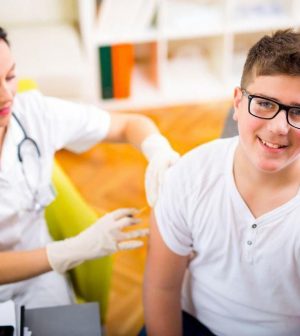- Recognizing the Signs of Hypothyroidism
- 10 Strategies to Overcome Insomnia
- Could Artificial Sweeteners Be Aging the Brain Faster?
- Techniques for Soothing Your Nervous System
- Does the Water in Your House Smell Funny? Here’s Why
- Can a Daily Dose of Apple Cider Vinegar Actually Aid Weight Loss?
- 6 Health Beverages That Can Actually Spike Your Blood Sugar
- Treatment Options for Social Anxiety Disorder
- Understanding the Connection Between Anxiety and Depression
- How Daily Prunes Can Influence Cholesterol and Inflammation
There Are Many Good Reasons for Kids to Get the COVID Vaccine

Parents need to know that COVID-19 shots are safe and effective for kids age 12 and older, an expert says.
While the Pfizer vaccine is approved in the United States for emergency use in this age group, parents may need reassurance, said Dr. Jessica Ericson, an infectious disease pediatrician at Penn State Health Children’s Hospital in Hershey.
“The vaccines went through rigorous studies and were found to be safe,” she said in a hospital news release. “I know people are worried about long-term effects since the vaccines have been in trials for only nine months to a year, but the majority of side effects happen in the first few days to three months, and we’re well past that now.”
Possible side effects in kids are the same as in adults. They include low-grade fever, body aches, fatigue and pain at the injection site. If a child has symptoms that last more than two days, such as a fever of 102 degrees or higher, parents should call the doctor, Ericson said.
There have been a dozen or so reports of heart inflammation (myocarditis) in children after getting the vaccine, but she said it’s not clear if there’s a direct link to the shot.
The vaccine is safe for kids with allergies or chronic health conditions, and is safe to give alongside other childhood immunizations, according to Ericson.
A vaccine trial with teens did not report any adverse reactions or complications, and the vaccine was found to be 100% effective in 12- to 15-year-olds — a better rate than among adults.
“In the study group of 1,000 teenagers who had the vaccine, none got COVID-19 compared to 16 teens in the placebo group of 1,000 who got COVID,” Ericson said. “That’s pretty amazing.”
Still, some parents may hesitate to get their kids vaccinated because they’ve heard that children don’t get as sick with COVID-19 or spread the virus as easily.
“It is true that children are less likely to get severely ill from COVID-19 or die, but even healthy kids can get very sick and end up in the hospital,” Ericson said. “The pandemic isn’t over, so it’s really a choice between getting natural COVID or getting the vaccine, and we know the risks of having a serious reaction to the vaccine are far smaller than the risk of serious illness from COVID.”
Another benefit: Vaccinated kids probably won’t have to quarantine if they’re exposed to COVID, so they won’t have to take a break from team sports or stop seeing friends or grandparents.
“Getting vaccinated is the best and quickest way to resume ‘normal’ life,” Ericson said.
More information
The U.S. Centers for Disease Control and Prevention has more on COVID-19 vaccines for children and teens.
SOURCE: Penn State Health, news release, June 9, 2021
Source: HealthDay
Copyright © 2026 HealthDay. All rights reserved.










